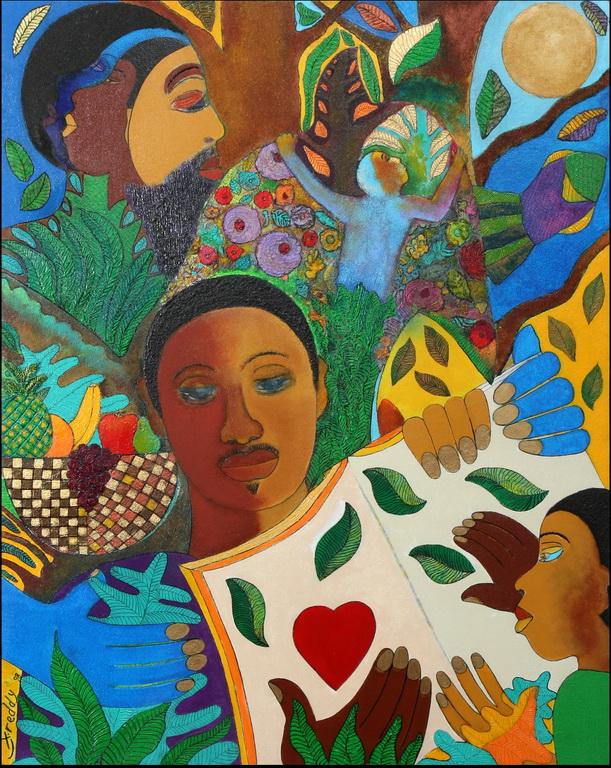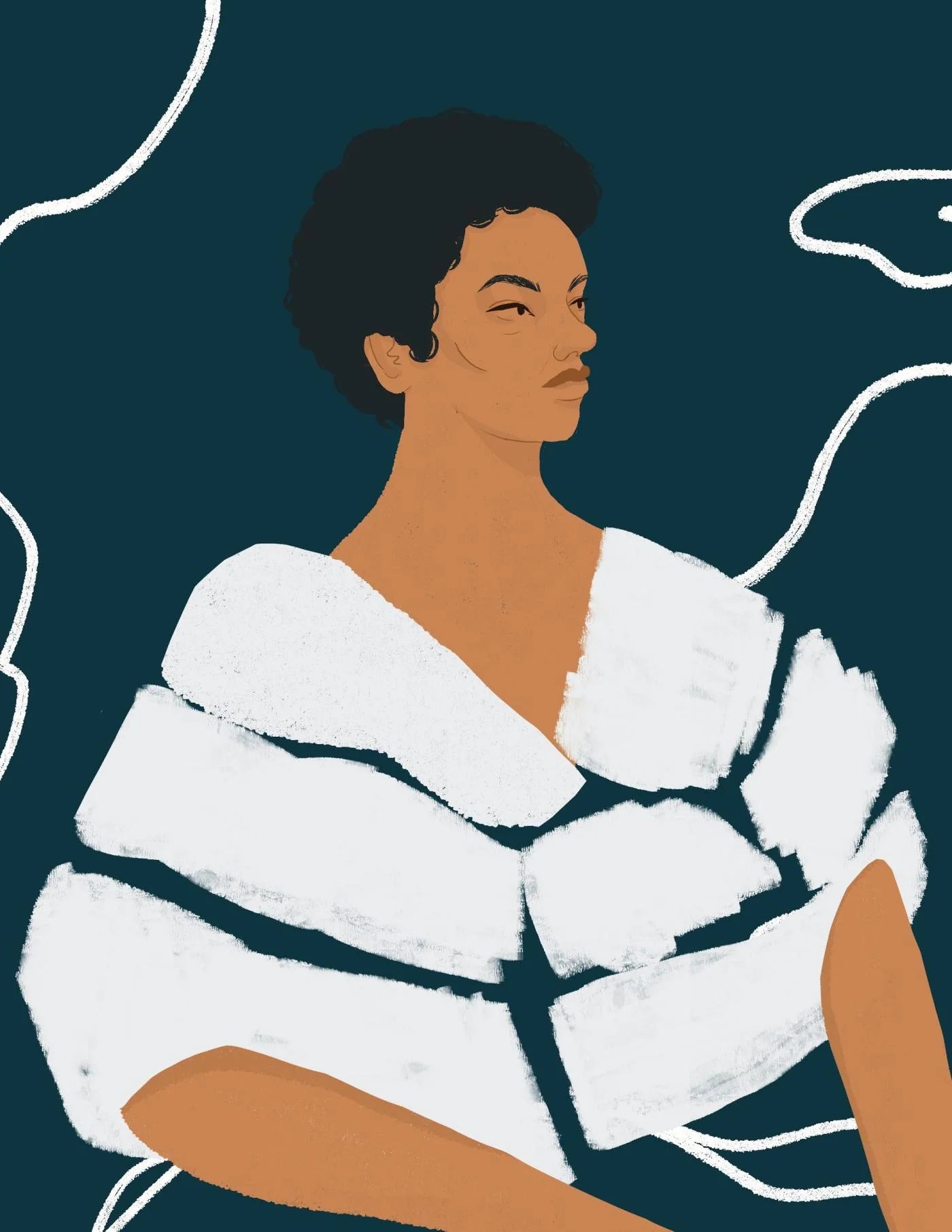WORDS: JAMILA REDDY | ART: LOVEIS WISE
My father is an artist, poet, activist, and musician. Born on August 6th, 1945 — the same day the United States dropped a nuclear bomb on Hiroshima — my father came of age during the civil rights movement and was a key player in a notable case in Charlotte, NC.
In January of this year, my father was diagnosed with Multiple Myeloma (cancer in the plasma). Together we've been exploring health, wellness, and healing, and I sat down with him to chat about navigating all the things that try to kill us and fail.
JAMILA REDDY: How is your health?
THOMAS JAMES REDDY: Well, I really think that health — to a considerable extent — is a state of mind. I’ve never had this illness before, so I don’t know what I’m expected to feel or not feel, to know or not to know. As far as I’m concerned, it’s my mind that’s the key to a healthy body. When I look at my paintings, there all these health-related images: trees, fruit, water, the changing of seasons. I’m attuned to how important ecology is in reference to health. All of the things that are in the air, the water, and the land contribute to our health, and we don’t really acknowledge that. We take it for granted. There’s a direct correlation with the health of the Earth and the health of our bodies.
JAMILA: What’s your definition of health?
T. J.: That’s a good question. Health is a well-managed and maintained attention to being emotional, physically, and spiritually well.
JAMILA: How do you know when you’re healthy?
T. J.: Because of what I do to be that way. The foods that I eat, the exercise that I do, the attention that I give to finding out if I’m not feeling well, what I can do to improve my condition. It’s a sense of having the “VVV” — the vim, the vigor, and the vitality. You’ve got energy. Your mind works. You’re not fatigued. You don’t have afflictions — strains and pains and things. You’re not beset by all of that. That’s how I know.
JAMILA: So… How is your health? You didn’t really answer that question.
T. J.: I’ve been diagnosed with Multiple Myeloma, and I don’t know what that’s supposed to be. Some days I feel like I can run a marathon. Other days, I feel like I can barely get out of bed. So, it’s an ebb and flow kind of thing. I don’t really know how to measure it, to tell you the truth.

JAMILA: What have you learned since this diagnosis?
T. J.: I’ve learned that the medical profession and the pharmaceutical industries are in cahoots. That’s what I’ve learned. I’ve learned that in the context of that connection, there’s another element in the triumvirate, and it’s the military. I read this article in the New Yorker that was very revealing. “The Family That Built an Empire of Pain.” [Reading] “The Sackler dynasty’s ruthless marketing of painkillers has generated billions of dollars—and millions of addicts.”
There are socioeconomic and political forces that make it possible for people to be sick — to be made sick— with certain ploys that are very well designed, i.e. the Tuskegee studies, where Black men were actually injected with Syphilis. People say, “Oh no, that wasn’t the case!” Yes, it was. You make people sick and then you come up with these ploys to heal them by introducing all of these mystery cures that are synthetic — that are basically a ploy to generate money at the expense of people’s health. The additives in the food, the hormones, the artificial ingredients, the chemicals — our bodies are being affected. Those things are cancer-causing and are not known to provide any improvements to the health condition of people who consume them.
JAMILA: Do you think that the medical industrial complex and the pharmaceutical industry and the food industry are the reasons you have this cancer?
T. J.: That’s a good question. I would say to some extent, yes, and then again, no. I think the reason that I am alive is because I stopped eating meat 50 years ago.
JAMILA: What led to your decision to change your diet? To cut out meat?
T. J.: In the sixties, I became really sick with an intestinal ulcer, and it was very dangerous to my life. While I was recovering in the hospital … the hospital was grinding up beef. Everything was pureed. All the meats were just like puddings. I started asking, “What is this stuff? Every time I eat it, it makes me hurt more. My system doesn’t want to absorb it and accept it.” It got me wanting to know more. In the sixties, there was a lot of attention to health concerns. Someone in the neighborhood had opened a health food store with natural foods and supplements. I started getting really interested in that, and, because I was an athlete, I knew that the way to have a winning performance was diet, exercise, and rest. Food was a critical fuel source for nurturing and nourishing the body. So it was relatively easy for me to stop eating meat.
JAMILA: So what does your healing look like now?
T. J.: The medical industrial complex wants me to involve myself in this stem cell procedure that is not really known to provide any more longevity to my life. I see it as once again a ploy to clone — to come up with genetically manufactured beings. It’s this bizarre kind of experiment on people’s lives, with creating this Frankenstein kind of thing. I’m going like, “Uh, I don’t think so.”
I think the medical profession has a place in improving the quality of people’s lives, I don’t want to discount that. But I don’t put as much emphasis on it as others do. People take 10, 15, 20 pills a day at an enormous cost — not only to their pocketbook but also to their lives. I think that a naturopathic or a homeopathic approach — both as a preventative measure and as a supplement to the medical drugs — is helping me feel better and be better. Ironically, it’s the medicines that are taken to improve the condition of one's health, that are actually causing more medical problems.
It’s amazing. You look at the TV and every day there’s a new medicine on the market, designed to help some condition — some malady — and then at the end of it they go, “This stuff can kill you and make hair grow out of your hands and on and on and on.” It tells you all the contraindications and the difficulties that you can expect to incur as a result of taking this stuff. But it’s still on the market. It’s out there. That shouldn’t be allowed to happen. That should be outlawed. Just like the Klan is a terrorist organization and the people who are associated with it — its members — espouse all of this racial hatred. It should be outlawed. It’s a domestic terrorist organization. The Klan is just like bad medicine on the market to make money at the expense of people’s lives. And it’s wrong.
And that’s how I feel about not being a guinea pig and not being a specimen for the experiments of an industry that really doesn’t care about my life. They care about making money at the expense of my life. And it’s not right. And I don’t have to subscribe to it or be involved in it in a way that doesn’t give me another opportunity to make choices. That’s where I am.
JAMILA: So… healing for you looks like not relying on the medical industrial complex to facilitate your healthy life?
T. J.: I think that basically, if you eat the right kinds of foods, drink clean water, keep your body hygienically functioning, exercise, reduce the amount of stress, and engage in activities that make you feel better — like being around people who are positive thinkers — then you’ll live longer.
JAMILA Are you doing those things?
T. J.: Yes, a lot more now than I used to! Because, like I said, as an athlete, you have to work at it. You have to be trained, you have to condition, you have to practice. You have to be involved in the action. By having been in a mindset to do that, it’s easier for me to pay attention to what I need to get healthy.
JAMILA: You mentioned that health is your emotional, physical, and spiritual wellness. What are some of the ways you're approaching healing outside of your physical health?
T. J.: I’m an artist, and I think that the mindset — what kind of intellectual activity that goes on in your mind — sustains a certain kind of attention to the way you live. Being an artist puts me in the mindset of having creative approaches to life — by using my imagination to do things creatively. That helps sustain me in a positive way. That’s a good question. You ask good questions.
JAMILA: If you could say it succinctly, what sustains you?
T. J.: The art of living.
JAMILA: The art of living?
T. J.: The art of living. There must be a direct correlation to art in terms of creativity and imagination. It’s important to leave the environment and your life more beneficial and beautiful after you leave it than before you came to it. That’s how I see the art of living.

JAMILA: What are some of the ways that you’ve changed your environment in a beneficial and beautiful way?
T. J.: Well, I have children who have taken some of my values about the quality of life and included them in their own lives — who express it so that others can know the benefits. My writings, my poetry, and my art leave a message about my concern for the human condition. My way of showing up in the world — I don’t wear synthetic stuff. I try to keep my thinking as natural as possible. I’m not a serial killer. I recycle. I take the time to realize that my mind is not the only thing that makes it possible for me to be alive.
JAMILA: So your contribution is creatively manifesting your values in the world?
T. J.: That’s it.
JAMILA: Thanks, Dad. Any questions for me?
T. J.: Why do you do this? Why is it that you seem to be interested in documenting the thoughts and responses of other people?
JAMILA: I do it because I recognize that a source of a lot of the suffering in the world is from distortion of the truth.
T. J.: That’s the truth.
JAMILA: Yeah. A lot of the emotional and spiritual distress that people feel is a result of consuming false narratives and distorted images. So it feels like a very generous response to really sink myself into what is real, not just as a matter of my own survival in the world, but to share that with other people so they can benefit from it.
T. J.: I do the same thing.
JAMILA: I know. So people don’t get caught up in the matrix! A lot of people are caught up in the matrix and they don’t know it.
T. J.: Yes. Running in the maze.
JAMILA: I want people to say, “Wow, that’s not even real, and if I release my attachment to these false narratives and distorted images, then I can experience a lot more freedom and a lot more joy.”
T. J.: Absolutely. I think the same way.
JAMILA: Yeah. So. That’s why I do it.
T. J.: That’s a good reason.



